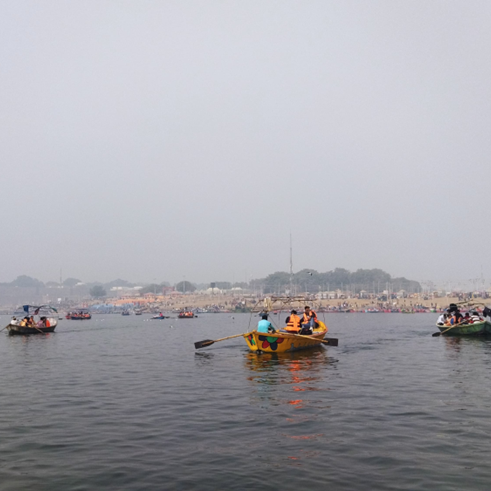Assessing WaSH Challenges at Kumbh Mela 2025: A Collaborative Study

This groundbreaking project, funded by the National Mission for Clean Ganga and the Ministry of Jal Shakti, Government of India, aims to assess the impact of the floating population during the Maha Kumbh Mela 2025 in Prayagraj. In collaboration with Hokkaido University, Japan, IIT-BHU, and IIT-Roorkee, our Centre is conducting a comprehensive study to evaluate the water, sanitation, and hygiene (WaSH) challenges posed by the influx of nearly 400 million pilgrims expected between January 13 and February 26, 2025.
Project Focus and Objectives
The study examines the WaSH-related challenges faced by Prayagraj during Kumbh Mela, with an extended focus on waste management and public health, recognizing their deep interconnection with sanitation infrastructure. Our research aims to provide data-driven recommendations to enhance decision-making for future Kumbh Melas, ensuring improved sanitation, hygiene, and sustainable urban management.
A Data-Driven Approach to Addressing Challenges
Despite significant efforts by the Government of India to improve sanitation in previous Kumbh Melas, reports highlight ongoing issues, including open defecation, inadequate sanitation facilities, and unpleasant environmental conditions. Additionally, the temporary surge in population poses risks of water stress, impacting both the city and local livelihoods.
To address these concerns, our study will collect primary data from Kumbh Mela 2025, mapping the perceptions, attitudes, knowledge, and behaviors of key stakeholders in managing WaSH at the world’s largest religious gathering. By identifying gaps and opportunities, we aim to contribute to more sustainable and efficient sanitation strategies for future events of this scale.
Through this collaborative effort, we seek to drive impactful policy recommendations that enhance Prayagraj’s resilience and infrastructure, ensuring a cleaner, healthier experience for millions of pilgrims while safeguarding the city's resources.
